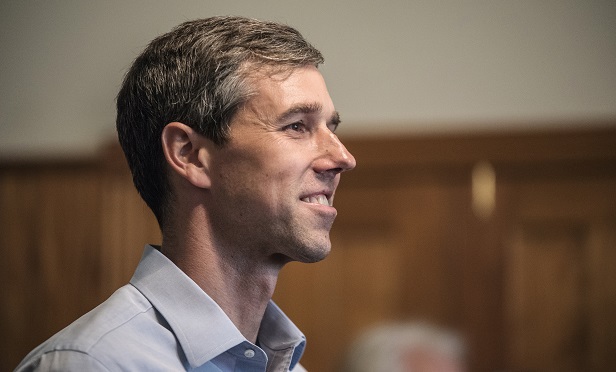
 Rep. Beto O'Rourke, the Democrat running for U.S. Senate in Texas. (Photo: Sergio Flores/BB)
Rep. Beto O'Rourke, the Democrat running for U.S. Senate in Texas. (Photo: Sergio Flores/BB)
Democrats are conflicted over the path back to power, caught between catering to a base that is seething with anger toward President Donald Trump and appealing to voters in Republican-leaning parts of the country who they'll need win control of Congress.
A debate about an attack plan for the November elections pits two party factions that have been competing for dominance. The establishment wing wants to run on safe issues like rising health care costs and opposition to the GOP tax overhaul. The party's progressive movement sees a rare opening to re-imagine the Democratic agenda with more daring proposals like government-guaranteed jobs, expanding Medicare to all Americans, and reducing the proliferation of guns.
"There's one big unifying factor, which is the disgust of the Trump administration," said Stephanie Schriock, the president of Emily's List, which works to elect Democratic women. But beyond that "every candidate is different, every voter is different," she said.
Trump may be a political gift for party unity, but that may not be enough to build a durable coalition of voters.
Broad Appeal
Less than seven months from the Nov. 6 election, Democrats are without an overarching agenda for how they would govern if they gain power. Their challenge is coming up with one that's broad enough to cover the political circumstances of progressives running in solidly Democratic states, like Massachusetts Sen. Elizabeth Warren, as well as conservative Democrats running in Trump country, such as West Virginia Sen. Joe Manchin.
"My view is we should continue to focus on key issues in the election, including the fact that people are facing rising health care costs and other pocketbook issues," said Sen. Chris Van Hollen, who is leading the election operation for Senate Democrats.
The Maryland Democrat has the unenviable task of defending 10 seats in states that Trump carried in 2016 and trying to win in Republican states like Arizona or Tennessee to gain the two seats needed to flip control of the Senate. In his view, that means winning independents and GOP-leaning voters.
"This is a case where our members know how to best represent their constituents and they will always fight for their states first," Van Hollen said.
Pocketbook Issues
Rep. Beto O'Rourke, the Democrat challenging Sen. Ted Cruz in Republican-dominated Texas, is taking the pocketbook approach. His message to voters is that the Republican tax law's repeal of the individual requirement to buy insurance will destabilize the health care market and cause higher premiums. He argued that will eat up any extra take-home pay for many people.
"If you're lucky enough to still have health insurance, what tax cut?" he said.
Establishment Democrats are resisting calls from figures on the left like billionaire Tom Steyer and the activist group MoveOn.org to campaign on impeaching Trump if the party seizes the House. Many Democratic leaders, including Van Hollen, argue that they should avoid that conversation and instead let Special Counsel Robert Mueller's investigation of the Trump campaign's possible coordination with Russia play out.
Arousing Republicans
Sen. Jeff Merkley, an Oregon Democrat, said impeachment is "probably not" a productive conversation to have now. "I'll let Tom Steyer do his own thing," he said.



